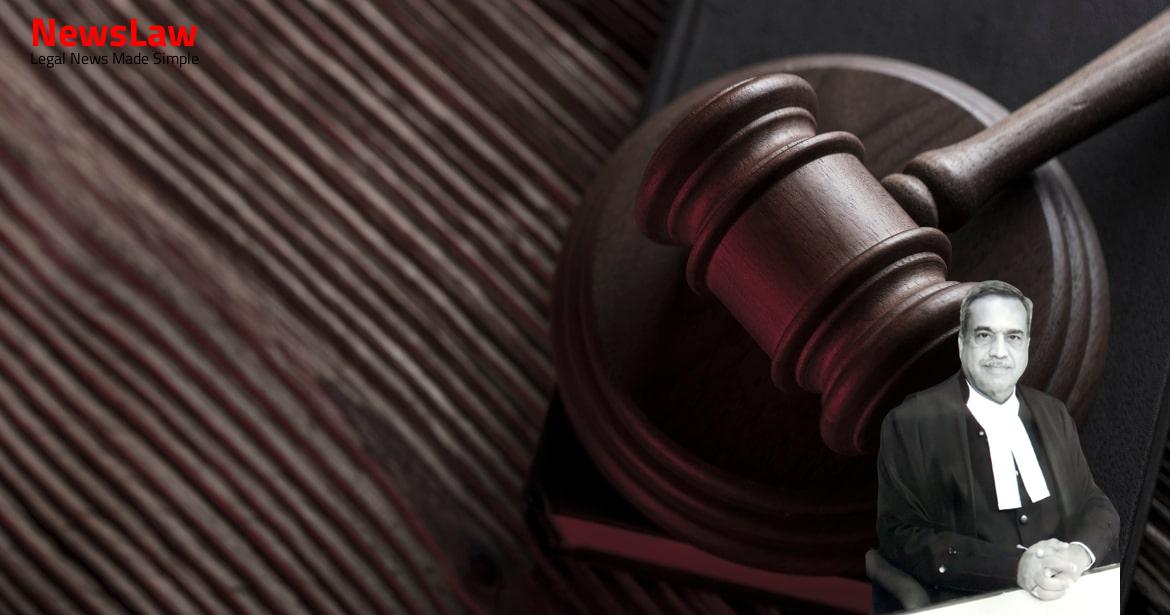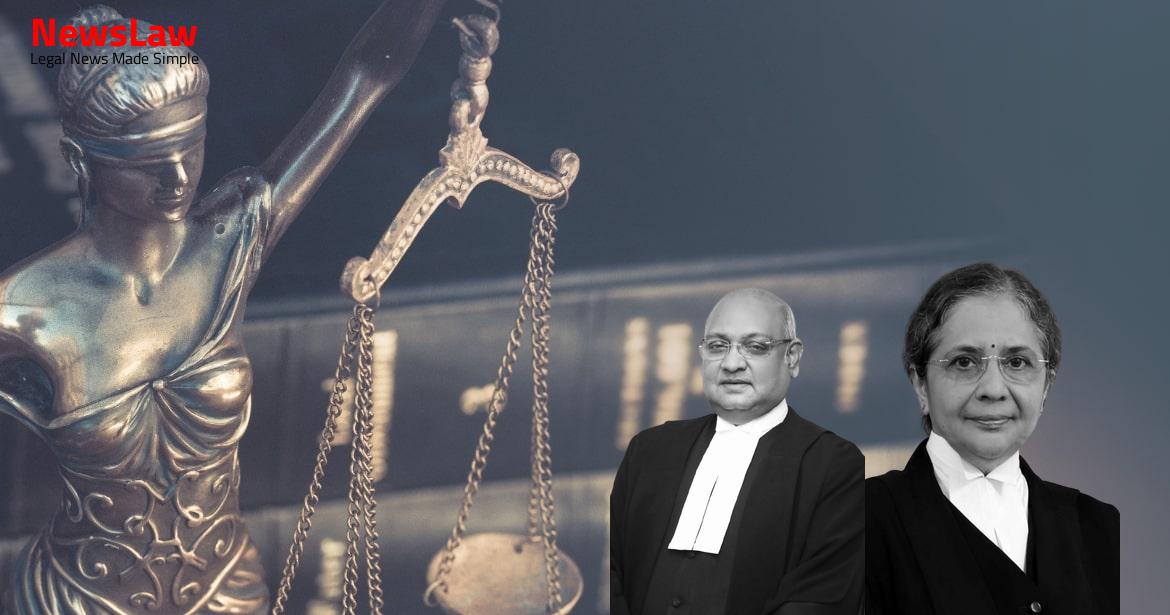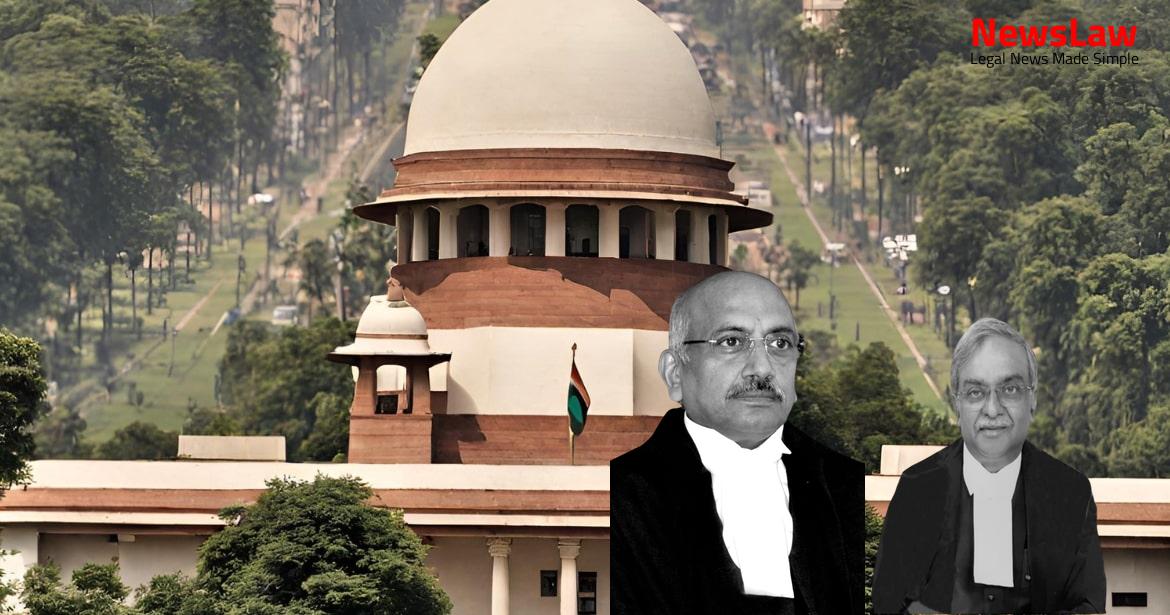Delve into the detailed legal analysis conducted by the court in a recent case concerning bail orders in serious offense matters. The court’s assessment of various factors such as the nature of the offense, gravity of accusations, and prima facie view of the evidence highlights the intricate considerations involved in granting bail. This summary underscores the importance of a reasoned judicial approach and adherence to legal principles in bail decisions.
Facts
- The appellant filed appeals against the High Court’s orders releasing Arif, Kamlesh, and Bhojraj Singh on bail in connection with FIR No.210 of 2017.
- The original informant/complainant filed an FIR against the accused for various serious offences including murder.
- The High Court allowed the accused to apply for bail after recording statements of material witnesses.
- Charges were framed against the accused on 09.02.2018, with a supplementary charge sheet filed against the main accused in 2019.
- The High Court granted bail to Arif, Kamlesh, and Bhojraj Singh on different dates in 2019.
- The bail applications of the accused were initially dismissed by the Sessions Judge due to the gravity of the accusations.
- The incident involved a brutal attack on the deceased, Sumer Singh, with multiple injuries inflicted using blunt and sharp weapons.
- The FIR detailed the events of the incident, including a planned ambush by the accused parties with weapons like swords, knives, and lathis.
- The accused were aware that Sumer Singh, a BSF member on leave, was their target for murder.
- Arif and Bhojraj Singh’s bail applications were previously rejected by the trial court before being granted bail by the High Court.
- The bail applications of Kamlesh, Arif, and Bhojraj Singh were also rejected earlier by the High Court.
- The accused pounced on the victim and stabbed him with sharp weapons while he was on the ground.
- Supplementary charge-sheets were filed against Hari Singh, Surjit Singh, Dalip Singh, and Rajendra Singh.
- There are 38 witnesses listed to be examined by the prosecution.
Also Read: Electoral Malpractices in Mayor Election
Arguments
- Petitioner vehemently submits that the High Court did not consider the brutality and seriousness of the crime while granting bail to the accused.
- Counsel highlights the brutal and pre-planned manner in which the deceased was killed, with multiple injuries on his body.
- Opposition to bail application from the learned Public Prosecutor and complainant’s counsel.
- References made to previous court decisions supporting the objection to bail.
- Arguments against bail include the number of injuries on the deceased’s body, lack of reason in the High Court’s bail decision, and the charged offence under Section 302 read with Section 149 of the IPC.
- Emphasis on the fact that the accused were part of an unlawful assembly and had a motive due to prior enmity.
- Pointing out the High Court’s failure to consider the seriousness of the crime and the implications of granting bail.
- Comparison made to the case of Mahipal regarding the assessment of bail orders by the Appellate Court.
- The High Court noted submissions on behalf of the accused and the Learned Public Prosecutor before releasing the accused on bail.
- The accused have been in custody for over a year and only 3 out of 36 witnesses have been examined.
- The High Court reserved liberty to move a fresh bail application after the initial rejection.
- Accused have not misused liberty or breached bail conditions since release.
- Prosecution alleges accused were part of an unlawful assembly and actively participated in the offenses.
- The Public Prosecutor and complainant opposed the bail application.
- High Court granted bail without expressing opinion on the case merits, despite the seriousness of the offenses.
- Medical evidence shows deceased had 26 injuries and injured person had 11 injuries from sharp and blunt weapons.
Also Read: Balancing Power and Transparency: Electoral Bonds Struck Down, Disclosure Mandated
Analysis
- The assessment of whether a case is fit for the grant of bail involves the balancing of numerous factors, such as the nature of the offence, severity of the punishment, and a prima facie view of the accused’s involvement.
- Reasonable apprehensions of witness tampering or threats to the complainant should weigh with the court in bail decisions.
- Appellate courts assessing bail orders focus on improper or arbitrary exercise of discretion rather than a detailed analysis of evidence.
- The court should consider the nature of allegations, gravity of offences, and role of the accused when granting bail for serious offences.
- The court must provide reasons for prima facie concluding why bail was granted, especially in serious offence cases.
- High Courts granting bail without due application of mind, contravening court directions, or for improper reasons risk having those bail orders set aside.
- There is a higher burden on appellate courts to provide specific reasons when granting bail after a previous denial.
- A court must balance factors when deciding bail, without a strict formula, ensuring judicious exercise of discretion.
- An order granting bail needs to demonstrate a prima facie view of evidence and reasons for granting bail, not merely stating counsel’s contentions.
- Detailed examination of evidence is not required for bail decisions, but a prima facie case should be considered.
- Judges must record reasons for bail decisions to show the judicious exercise of discretion.
- The lack of consideration of relevant factors or granting bail on irrelevant grounds may lead to a superior court setting aside the bail order.
- The court should be satisfied with a prima facie case for granting bail, without exhaustive exploration of the case merits.
- High Courts must provide detailed reasoning in bail orders; a lack of reasons indicates potential non-application of mind.
- An appellate court is required to consider whether the order granting bail suffers from a non-application of mind or lacks a prima facie view of the evidence on record.
- The power to grant bail under Section 439 of the CrPC is of wide amplitude but must be exercised judiciously and not as a matter of course.
- Factors that guide the exercise of power to grant bail include the nature of the crime, seriousness of the offence, and a prima facie satisfaction of the court in support of the charge.
- An order for bail must not be bereft of cogent reasons, and frivolity in prosecution should be considered. An order granting bail without proper considerations can be set aside.
- The cancellation of bail due to subsequent misconduct by the accused is distinct from an order granting bail that is unjustified, illegal, or perverse.
- Recording reasons in a judicial order ensures scrutiny and ensures it meets objective standards of reason and justice.
- The principles guiding the grant of bail emphasize the nature of accusations, the severity of punishment, and the possibility of interference with witnesses or complainants.
- The nature of the offence is a fundamental consideration for the grant of bail, with heinous crimes having a higher chance of bail rejection.
- Merely stating ‘having perused the record’ or ‘on the facts and circumstances of the case’ is insufficient for a reasoned judicial order.
- Considerations for bail touch upon individual liberty and the interests of the criminal justice system in ensuring justice is not obstructed.
- Reasons for finding the bail orders to be perverse have been indicated.
- The High Court’s disposal of the bail applications in a single paragraph in (2020) 11 SCC 648 is noted.
- The court finds the orders granting bail to the accused to be suffering from perversity.
Also Read: Recall of Resolution Plan Approval: Legal Analysis
Decision
- Pending application(s) disposed off
- Impugned orders of High Court granting bail to accused not meeting the test laid down by the Supreme Court
- Reference to various Supreme Court decisions on grant of bail and appellate court powers
- List of accused, SLP numbers, and dates of High Court bail orders provided
- Direction for all accused to surrender immediately
- Copy of the order to be sent to Sessions Judge for compliance
Case Title: KUMER SINGH Vs. THE STATE OF RAJASTHAN (2021 INSC 343)
Case Number: Crl.A. No.-000571-000571 / 2021



